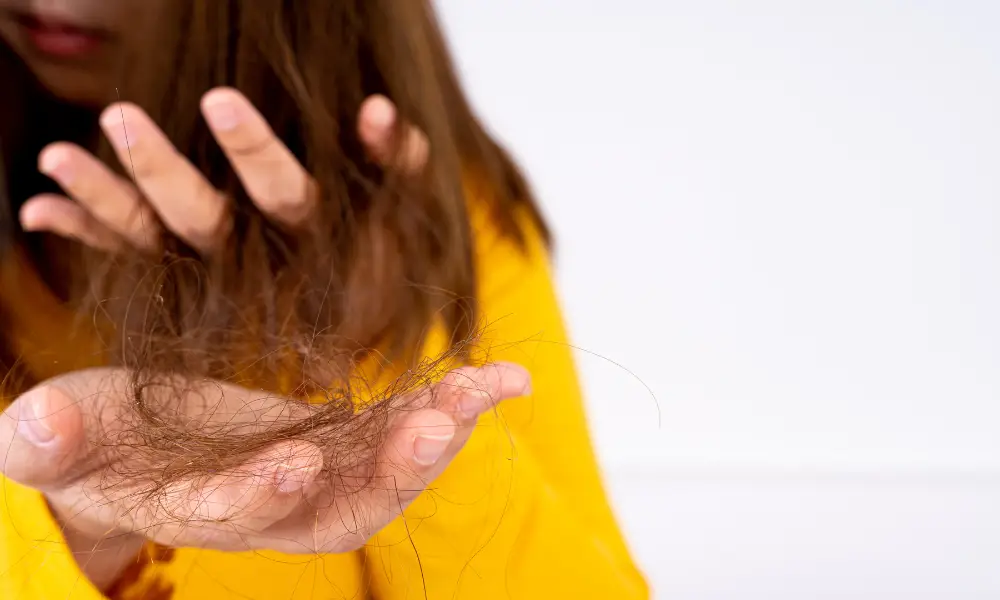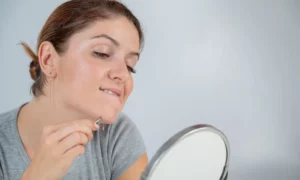Polycystic Ovary Syndrome (PCOS) is a common condition affecting many women worldwide, characterized by hormonal imbalances that can lead to various health issues, including hair problems. In this article, we’ll explore the intricate relationship between PCOS and hair health, most importantly providing valuable insights and practical solutions for hair treatment for PCOS and much more.
Contents
- 1 What Are PCOS-Related Hair Problems?
- 2 Importance Of Early Detection Of PCOS Hair-Related Problems
- 3 Professional And Medical Options For Hair Care
- 3.1 Prescription Medications
- 3.2 Topical Treatments
- 3.3 Hormone Replacement Therapy (HRT)
- 3.4 Platelet-Rich Plasma (PRP) Therapy
- 3.5 Low-Level Laser Therapy (LLLT)
- 3.6 Hair Transplantation
- 3.7 Scalp Micropigmentation (SMP)
- 3.8 Consultation with a Dermatologist or Trichologist
- 3.9 Lifestyle And Nutritional Counseling
- 4 Natural Remedies For Healthy Hair
- 5 Conclusion
What Are PCOS-Related Hair Problems? 
Polycystic ovary syndrome (PCOS) is a hormonal disorder that affects individuals with ovaries. PCOS can be associated with various symptoms, including changes in hair growth and texture. The hormonal imbalances characteristic of PCOS can lead to specific hair problems. Here are some PCOS-related hair issues:
- Hirsutism
Hirsutism refers to the excessive growth of coarse and dark hair in areas where men typically grow hair, such as the face, chest, and back. PCOS is one of the leading causes of hirsutism in women. Elevated levels of androgens (male hormones) contribute to this excessive hair growth.
- Male-pattern baldness (Androgenic Alopecia)
Women with PCOS may experience thinning of hair on the scalp, similar to male-pattern baldness. This is also attributed to the influence of androgens on hair follicles.
- Scalp Hair Thinning
Some women with PCOS may notice a reduction in the thickness of scalp hair. This is often related to hormonal imbalances affecting the hair growth cycle.
- Alopecia Areata
Alopecia areata is a condition characterized by the sudden loss of hair in small, round patches. While it is not exclusive to individuals with PCOS, some women with the syndrome may experience this form of hair loss.
- Oily Scalp and Hair
Elevated androgen levels in PCOS can contribute to an overproduction of sebum (oil) in the scalp, leading to greasy hair. This excess oiliness can be associated with dandruff and may affect hair texture.
- Changes in Hair Texture
Hormonal imbalances in PCOS can alter the structure of hair, making it finer or coarser. Some women may notice changes in their hair texture, including increased frizziness or dryness.
- Irregular Hair Growth
PCOS-related hormonal imbalances can disrupt the normal hair growth cycle, leading to irregular patterns of hair growth. This may result in patches of increased hair density or areas where hair growth is stunted.
Importance Of Early Detection Of PCOS Hair-Related Problems
Early detection of PCOS-related hair problems is crucial for several reasons, as it allows for timely intervention and management. Here are some key reasons highlighting the importance of early detection:
- Prevents Progression: Early detection helps prevent the worsening of hair problems associated with PCOS, allowing for timely intervention.
- Addresses Overall Health: Detecting PCOS-related hair issues early allows healthcare providers to assess overall health, identify hormonal imbalances, and address potential complications.
- Improves Quality of Life: Timely intervention improves the quality of life by managing symptoms, reducing emotional distress, and enhancing satisfaction.
- Manages Emotional Impact: Early detection enables support for managing the emotional and psychological impact of hair-related issues through counseling or support groups.
- Preserve Scalp and Hair Health: Identifying problems early allows for measures to preserve scalp health, prevent excessive hair loss, and address issues like oily scalp or dandruff.
- Customized Treatment Plans: Early detection allows healthcare professionals to tailor treatment plans based on individual needs, maximizing effectiveness.
- Prevents Secondary Complications: Addressing PCOS-related symptoms early may help reduce the risk of developing secondary complications, such as type 2 diabetes or cardiovascular disease.
- Promotes Long-Term Well-Being: A proactive approach in the early stages of PCOS promotes long-term health and well-being for individuals affected by the condition.
- Enhances Fertility Planning: Early detection allows for proactive management to improve fertility outcomes for those planning to conceive.
- Optimizes Personalized Care: Identifying PCOS-related hair issues early facilitates personalized care, considering the unique needs and concerns of each individual.
In short, early detection of PCOS-related hair problems allows for personalized and targeted interventions to improve the quality of life and overall health of individuals affected by PCOS. If someone suspects they may have PCOS or is experiencing changes in hair growth, seeking timely medical evaluation is recommended for proper diagnosis and management.
Professional And Medical Options For  Hair Care
Hair Care
Professional interventions for hair restoration related to polycystic ovary syndrome (PCOS) may involve a combination of medical treatments and procedures aimed at addressing underlying hormonal imbalances and promoting hair growth. Here are some professional interventions that may be considered:
Prescription Medications
Minoxidil: A topical medication available over-the-counter, Minoxidil is FDA-approved to promote hair growth and is commonly used for various types of hair loss.
Anti-Androgen Medications: Prescription medications such as spironolactone or finasteride may be prescribed to counter the effects of androgens on hair follicles.
Topical Treatments
Topical Estrogen Creams: Applied directly to the scalp, these creams may help address local estrogen deficiencies and support hair health.
Corticosteroid Lotions: In cases of scalp inflammation, doctors may prescribe topical corticosteroid lotions to reduce inflammation and promote hair regrowth.
Hormone Replacement Therapy (HRT)
In cases of hormonal imbalance, healthcare professionals may consider hormone replacement therapy (HRT). However, it is crucial to make the complex decision to use HRT in consultation with a healthcare professional due to potential risks.
Platelet-Rich Plasma (PRP) Therapy
PRP involves drawing a small amount of the patient’s blood, processing it to concentrate platelets, and injecting the platelet-rich plasma into the scalp. Some studies suggest that PRP may promote hair regrowth by stimulating hair follicles.
Low-Level Laser Therapy (LLLT)
LLLT involves using low-level lasers or light-emitting diodes (LEDs) to stimulate hair follicles and promote hair growth. It is available in various forms, including laser combs, helmets, or in-office treatments.
Hair Transplantation
Surgical procedures like hair transplantation involve the removal of hair follicles from one part of the body (often the back of the scalp) and transplanting them to areas with thinning or no hair. This procedure can be effective for restoring hair density.
Scalp Micropigmentation (SMP)
SMP involves applying pigment to the scalp to create the illusion of thicker hair, making it a non-invasive cosmetic tattooing technique.
Consultation with a Dermatologist or Trichologist
Seeking guidance from a dermatologist or trichologist (hair and scalp specialist) is crucial for a thorough evaluation of the hair and scalp condition. They can provide personalized advice and recommend appropriate interventions.
Lifestyle And Nutritional Counseling
Healthcare professionals, including endocrinologists and nutritionists, may offer guidance on lifestyle changes and nutritional interventions to support overall health and hair growth.
The choice of intervention will depend on factors such as the severity of hair loss, individual health considerations, and personal preferences. A comprehensive approach that addresses both the underlying hormonal imbalances and promotes hair growth is often the most effective strategy.
Natural Remedies For Healthy Hair 
Maintaining healthy hair involves a combination of good hair care practices, a balanced diet, and lifestyle habits. Here are some natural remedies and tips to promote healthy hair:
- Gentle Hair Care
- Use a mild, sulphate-free shampoo and conditioner suitable for your hair type.
- Avoid washing hair too frequently, as it can strip natural oils. Opt for 2-3 times a week.
- Be gentle when wetting, washing, and detangling hair to minimize breakage.
- Natural Oils
- Coconut Oil: Massage warm coconut oil into the scalp and hair. Leave it on for a few hours or overnight before washing.
- Olive Oil: Apply olive oil to the ends of hair to moisturize and prevent split ends.
- Egg Mask
- Whisk an egg and apply it to damp hair. Leave it on for 20 minutes before washing. Eggs are rich in proteins that can strengthen hair.
- Avocado Hair Mask
- Mash a ripe avocado and mix it with a tablespoon of olive oil. Apply the mask to damp hair and leave it on for 30 minutes before rinsing.
- Green Tea Rinse
- Brew green tea and let it cool. Use it as a final hair rinse after shampooing to promote shine and reduce dandruff.
- Herbal Teas
- Rinse hair with herbal teas like chamomile or nettle tea. These teas may have soothing and strengthening effects.
- Scalp Massage
- Regularly massage the scalp using your fingertips to stimulate blood circulation and promote a healthy scalp.
- Avoid Heat Damage
- Limit the use of heated styling tools, such as flat irons and curling irons, to prevent heat damage.
- Protect Hair from the Sun
- Wear a hat or use hair products with UV protection to shield your hair from the sun’s harmful rays.
- Manage Stress
- Practice stress-reducing activities like yoga, meditation, or deep breathing exercises. Chronic stress can contribute to hair problems.
Conclusion
In conclusion, understanding and addressing hair problems related to PCOS requires a comprehensive approach that considers both physical and emotional aspects. By adopting healthy lifestyle habits, exploring various treatment options, and seeking professional advice, individuals can effectively manage PCOS-related hair issues and regain confidence in their appearance.
If you are facing PCOS related issues, PCOS treatment at HerMantra can help. Book your free trial online pcos treatment session now.


 Hair Care
Hair Care

